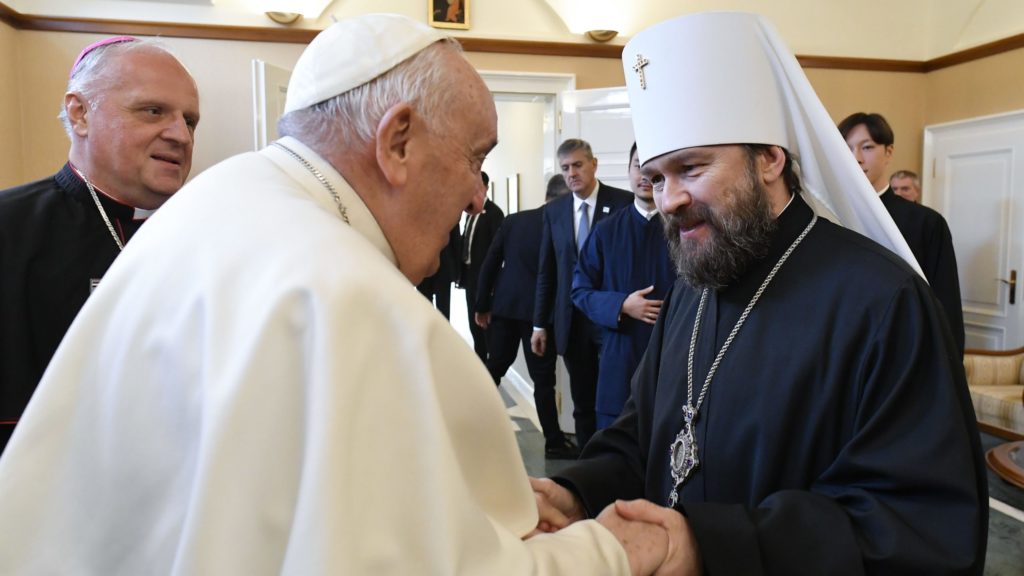Vatican Secretary of State Cardinal Pietro Parolin has confirmed that a peace mission is underway to end the conflict between Russia and Ukraine, saying he was surprised by the denials from both sides, as they had each been informed.
“There will be a peacekeeping mission. As far as I know, the two sides were informed at the time,” Parolin told journalists at a book presentation Wednesday, saying, “I’m surprised they say otherwise,” in reference to the denials of any knowledge of the initiative from both Ukrainian and Russian officials.
“As far as I know, they know. Then you know how it is, in the middle of the maze of bureaucracy it may be that communications do not arrive where they should arrive. But mine are only interpretations, I know that both sides have been informed,” he said.
Parolin voiced doubt on whether “the conditions exist today for a ceasefire,” saying, “We hope so, I believe that even the Vatican initiative, if there will be one, intends to go in that direction.”
Parolin’s remarks come after Pope Francis on his return flight from Budapest Sunday made cryptic remarks about a secret peacekeeping mission to end the Russia-Ukraine war, telling journalist on board that, “right now a mission is underway, but it is not yet public. When it is public, I will reveal it.”
He offered no further details, and in the confusion that followed both Ukrainian and Russian officials denied having any knowledge about a peacekeeping mission.
On Monday, CNN quoted an anonymous Ukrainian official close to the presidential office as saying the country had “no knowledge” of a Vatican peacekeeping mission. “President Zelensky has not consented to any such discussions on Ukraine’s behalf,” the source was quoted as saying, adding, “If talks are happening, they are happening without our knowledge or our blessing.”
A day later, Russian news agency TASS ran a story Tuesday quoting the press secretary of the President of the Russian Federation, Dmitry Peskov, who when asked during a press briefing if he knew anything about the Vatican’s peacemaking plans said, “No, nothing is known.”
Similarly, Russian Orthodox Metropolitan Hilarion of Budapest and Hungary, with whom Pope Francis met while visiting Hungary over the weekend, published a video on his diocese’s website Monday in which he also denied any knowledge of a peacekeeping mission, and said he and the pope had not discussed anything political in their conversation.
Speaking to Italian newspaper Il Fatto Quoditiano earlier this week, Italian economist Stefano Zamagni, the former president of the Pontifical Academy of Social Sciences and a close papal advisor also confirmed the existence of a peacekeeping mission, saying Pope Francis has been working on a plan for the past eight months, and that the “mission” could come to fruition within the next three months.
In his remarks Wednesday, Parolin also commented on recent drone attacks on the Kremlin, saying they make achieving peace more difficult.
“All actions of war, especially if they intend to create an even more hostile climate, do not lead to peace, and certainly do not bring peace closer,” he said, saying the Vatican would like for both sides “to arrive at a cessation of fighting and then start a peace process.”
He spoke on the margins of a presentation at Rome’s LUMSA University of a book on Italian priest Don Tonino Bello for the 30th anniversary of his death, having carried out a peace mission in Sarajevo to stop the war in the Balkans shortly before he died.
Parolin referred to the visit of Russian Orthodox Metropolitan Anthony of Volokolamsk, the Moscow patriarchate’s foreign minister, to Rome this week, where he met with the president of the Vatican’s Dicastery for Eastern Churches, Archbishop Claudio Gugerotti, and greeted Pope Francis briefly Wednesday at the end of the pontiff’s weekly general audience.
Anthony’s visit “is part of the normal communications that occur from time to time,” Parolin said, saying the metropolitan’s visit “has nothing to do with” the peacekeeping mission. “Anthony has always said that communications continue, and he is the representative of the Moscow Patriarchate.”
He reiterated the pope’s invitation to both Russian and Ukrainian officials to “find points of agreement and put an end to this massacre, which is severely affecting Ukraine but which also has considerable implications for Russia.”
Asked for details about the Vatican’s peacekeeping mission, Parolin declined, saying the pope mentioned it, and “we leave it to him to give any further information.”
Parolin reiterated his surprise at denials of the mission from Ukrainian and Russian officials, saying, “I don’t know what motivation or reasoning it responds to.”
He pointed to the figure of Don Tonino Bello, saying, “he really worked hard for peace, especially for the Gulf War, and then the Balkan War, and he proposed concrete signs of peace by exposing himself personally and asking for a commitment, not only verbal, in favor of peace.”
“Perhaps we need prophets of peace in our day,” he said.

